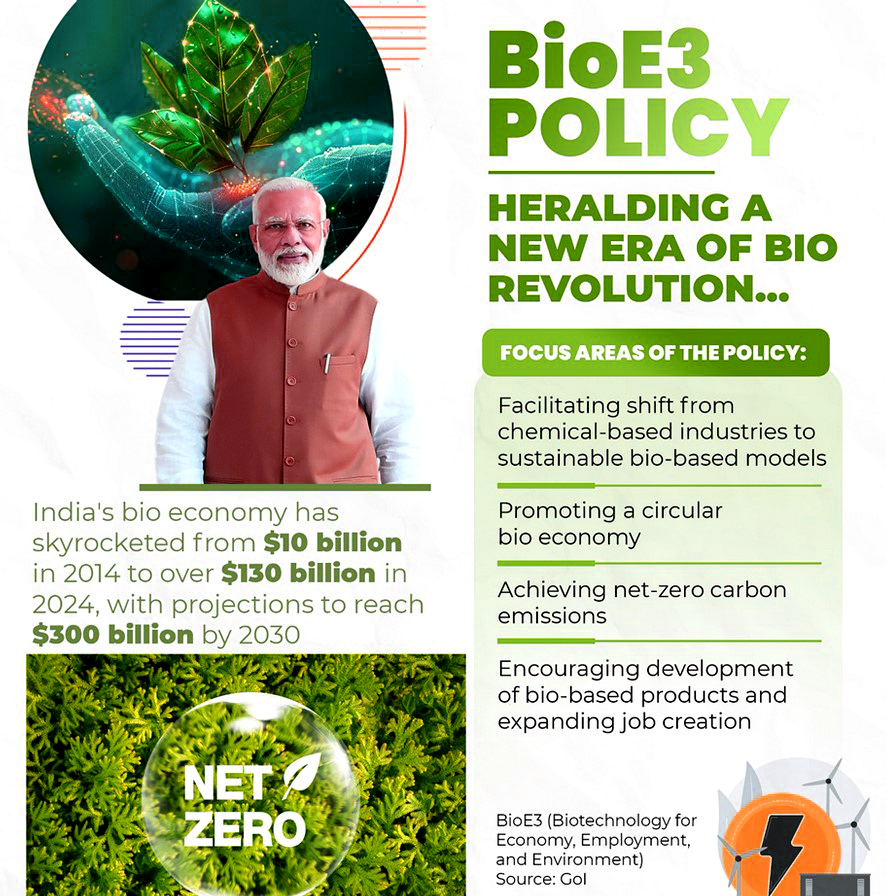Meta Description: India embarks on its first biological experiments aboard the International Space Station, studying microalgae and spirulina to enhance human life sustainability in space under the BioE3 biotechnology policy.
India’s Pioneering Space Biology Experiments on ISS Under BioE3 Policy
Table of Contents
- Introduction
- Overview of the BioE3 Biotechnology Policy
- Details of the ISS Experiments
- Significance for India’s Space Research
- Global Collaborations and Implications
- Future Prospects in Space Biotechnology
- Conclusion
Introduction
India will conduct its first-ever biological experiments as part of its mission to learn more about sustaining human life in space while exploring biotechnology opportunities. The experimentation will be part of the BioE3 Biotechnology policy which was launched by Prime Minister Narendra Modi.
The experiments will be a part of the next mission to ISS AXIOM-4, with an Indian astronaut Group Captain Shubhanshu Shukla as a team member.
Overview of the BioE3 Biotechnology Policy
The BioE3 (Biotechnology for Economy, Environment, and Employment) policy framework aims to accelerate the potential of India’s biotechnology sector into new horizons. It provides direction on research and development evolution that conform with environmental sustenance while spurring economic growth. In light of this policy the Government of India is endorsing activities involving biotechnology in space, agriculture, and health, serving as a mentoring opportunity for India to emerge as the world leader in biotechnology.
Details of the ISS Experiments
The next experiments will be conducted in ISS space focal point on understanding how human biological systems adapt to the microgravity of space. Primary objectives will be:
• Understand the effects of microgravity on human cells and tissues.
• Evaluate the potential for long term human habitation in space.
• Determine countermeasures to counteract negative adherent health effects when living in space for extended periods.
The results will provide important information on the different aspects of sustaining human life beyond Earth, and will also assist in future space missions focusing on deep space.
Significance for India’s Space Research
India’s establishment of biological experiments in space demonstrates a strategic increase in the capabilities of India’s space research. The Indian Space Research Organisation (ISRO) has focussed primarily on satellites and lunar landings, and is now conducting life sciences, which gives a holistic view of space research. This experiment will not only support India’s scientific endeavours but will ultimately support global scientific efforts to evaluate human physiology in space.
Global Collaborations and Implications
With an inclination towards global cooperation with international space agencies and research institutions, India is hoping to give back to a humanity it feels that it is part of. The results from the experiment on the ISS will prove beneficial in several areas including: • Constructing safer and more efficient life support systems for astronauts, • Informing medical science on Earth. This is particularly important in relation to the understanding of muscle atrophy and loss of bone density, • Providing proof of concept for biotechnology applications to extreme environments. Global collaborations like this example, highlight the importance of sharing knowledge for solving difficult scientific questions.
Future Prospects in Space Biotechnology
Should this experiment yield successful evidence, it can lead to larger projects such as: • Sustainable life support system development for potential human long-term travel to Mars and beyond • Bioengineered systems for food production in space, • Protocols for human reproduction and development outside the Earth System.
Through this proactive mindset, India has positioned itself as a key contributor in the future of space colonization and interplanetary travel.
Conclusion
India’s first biological experiment on the ISS marks yet another positive step in India’s existing scientific work on biotechnology in space. India furthers its knowledge of human adaptability and resilience by studying sustainability of human life in space. This project is a sign of India’s increasing capabilities in space science and reinforces its commitment to global scientific endeavor.
SEO Keywords: India ISS biological experiment, BioE3 biotechnology policy, human life sustainability in space, Indian space research 2025, International Space Station experiments, India’s space biotechnology, space life sciences India, BioE3 initiative, India’s ISS mission, space sustainability research
![]()

